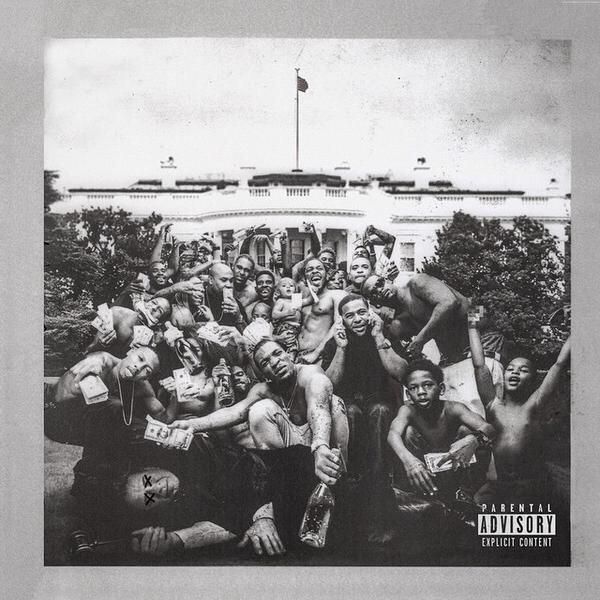
![Kendrick_Lamar_-_To_Pimp_a_Butterfly_coverart[1]](https://i0.wp.com/www.monstersandcritics.com/wp-content/uploads/2015/03/Kendrick_Lamar_-_To_Pimp_a_Butterfly_coverart1.jpg?resize=600%2C600&quality=20&ssl=1)
After three years, Kendrick Lamar is back with his follow up to the superb “good kid m.A.A.d city,” and holy s**t, it hits hard. The production is expansive, with glossy G-Funk grooves, squealing free jazz horns, dark atmospheres, clicky beats and swirling psychedelic synths.
Lyrically, he doesn’t waste a second, discussing racism, identity, class division, religion and social politics in his rapid fire style. His rhythm, wit and wisdom show Kendrick at the top of his game, weaving his rhymes through the music so effortlessly that the two often become indistinguishable, taking left turns freely to confidently challenge the audience without ever losing focus.
At 80 minutes, “To Pimp A Butterfly” is long, complex and emotional; a daunting and aggressive art piece that holds nothing back. In the hands of a less capable artist, it would be an indulgent, self righteous mess, but thankfully, Lamar manages to channel the audiences attention through vivid storytelling and a diverse sound, with each song shedding light on a different facet of our sociopolitical struggles in the United States.
“To Pimp A Butterfly” deals with these topics in a contemplative, conversational manner using anecdotes, imagery and colloquialisms to illustrate the issues at hand, making an engaging and thought provoking record that never gets too lofty to be enjoyable. Kendrick is confident but vulnerable, asking more questions than he answers while his concepts expand, overlap and contradict each other.
“Complexion (A Zulu Love)” is a laid back unity anthem followed by “The Blacker the Berry,” a gritty, divisive track in which he claims “I’m the biggest hypocrite of 2015,” using racial stereotypes and riot imagery for verses. Lamar’s political shout outs to Obama and Trayvon Martin timestamp the record in a way that will give context to our nation’s collective unease without sounding dated.
Musically, the Jamaican dancehall elements found on the latter track mark some of hip hop’s current trends without sounding trite or out of place. If anything, Lamar proves that he has refined the trend to maximum effect.
Despite it’s modern elements, “Butterfly” is sonically diverse, with call backs to classic rap, jazz, funk and soul music. Thankfully, it’s many experimental efforts don’t keep it from being a truly forward thinking hip hop record, complete with guest spots and sketches that have been morphed into musical interludes, further progressing the dialogue presented on the more standard tracks.
Songs like “How Much A Dollar Cost” and “You Ain’t Gotta Lie” take typical hip hop topics and flip them on their ear, providing a fresh perspective on classic themes. The former pits a rapper’s wealth against a homeless man, weaving a heart wrenching story that shows both sides without choosing one as righteous or offering a comfortable conclusion while “You Ain’t Gotta Lie” reverses hip hop’s rampant braggadocio saying “You ain’t gotta lie to kick it/You ain’t gotta try so hard,” reminding the listener to cut the crap and just be themselves.
Mind blowing opener “Wesley’s Theory,” the groovy “King Kunta” and the epic album closer “Mortal Man” provide deeper insight to the albums racial themes, but Lamar isn’t afraid to get personal. This is most notably heard on the brutal “u,” which finds him desperate, drunk and crying in a hotel room, repeating the phrase “loving you is complicated” over a brooding backdrop of ghostly synths, free jazz horns and voodoo pianos.
He toys with his phrasing, stretching his voice for one of his most tortured deliveries yet saying “I’m f**ked up, but not as f**ked up as you” as bottles clink to close out the choppy and haunting track.
It’s intensely atmospheric, angry, unhinged and absolutely brilliant. Like most of “Butterfly,” it’s not easy listening party music. It’s raw expression as art and works better as a part of the album than as an individual song. While some tracks are fun in a social setting, this is definitely a deep and rewarding “alone-in-headphones” record.
“To Pimp a Butterfly” shows Lamar expand his focus from his hometown Compton to include the social unrest in the United States. In doing so, he expands his sonic and emotional palette to match the severity of the situation, creating a dense and complex call-to-arms record that is as raw and chaotic as the Ferguson riots.
That said, it’s not without its soft spots, triumphs and catharses. Supple bass lines bounce around as phrases overlap and reappear across songs, each time with more context and meaning. All the while, the titular butterfly grows into a metaphor that gracefully encapsulate the album during the ambitious final track “Mortal Man.”
The whole record is so intricately layered that it will take a number of listens to fully grasp the nuances that tie it all together, but thankfully, it’s full of great grooves, hard beats and top shelf rhymes, making repeat plays a pleasure. “To Pimp a Butterfly” is as overstuffed, extravagant and demanding as it is wise, witty and deliberate; a challenging masterpiece from one of modern hip hop’s greatest thinkers.
4.5/5